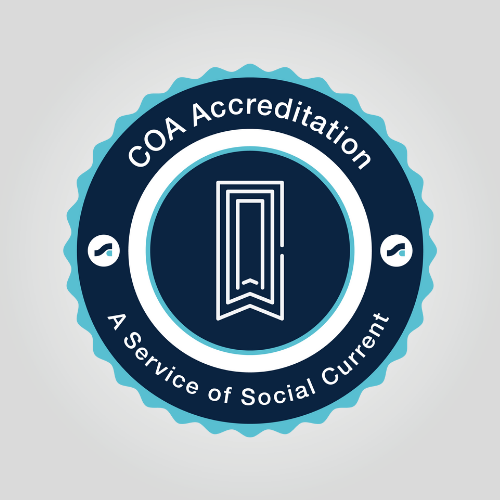June 10 @ 2:00 pm
This webinar will provide an introduction to Social Current and COA Accreditation. Participants will gain…COA Accreditation
Accreditation provides an independent and objective verification against standards of best practice. COA Accreditation, a service of Social Current, provides a partnership.
Our staff and volunteer peer reviewers work closely with organizations to help them enhance and align practices with our standards. More than an evaluation, our process builds the knowledge and skills to engage in continuous improvement, adopt best practices, and achieve organizational excellence.

Why Accreditation
To the outside world, accreditation recognizes that an organization adheres to a set of best practice standards. To staff inside the organization, it can be much more. COA Accreditation is a powerful tool—a framework for effectively managing resources, implementing best practices, and incorporating community voice.
Enhance Credibility
Accreditation promotes trust and reassures your stakeholders, including donors, partners, government agencies, and clients. The thorough review confirms that your organization adheres to best practices.
Improve Service Quality
The accreditation process helps organizations enhance their services by supplying best practice standards and supporting continuous quality improvement.
Staff Development
The accreditation process includes valuable training and professional development opportunities for your staff, making them even more effective in their roles.
Legal and Regulatory Compliance and Preferred Treatment
Accreditation ensures your organization stays in compliance with legal requirements and mandates. This protects your clients and safeguards your organization from legal risks.
Attract Funding
Accreditation is an advantage when securing funding. Donors and grantors often require or prefer accreditation. Where applicable, recognitions make accredited organizations eligible for public agency contracts and higher reimbursement rates.
Who We Accredit
COA Accreditation accredits the full continuum of social and human services. Our more than 1,700 accredited organizations are in all 50 states, six Canadian provinces, Puerto Rico, and military bases worldwide. COA Accreditation also supports Certified Community Behavioral Health Clinic (CCBHC) accreditation and Whole-Person Care through our Health Home/Integrated Care standards.
Private Organization Accreditation
For organizations that:
Canadian Organization Accreditation
For organizations that:
Public Agency Accreditation
For agencies that:
Child & Youth Development Accreditation
For organizations that:
The COA Accreditation Difference
Free Intro to Accreditation Webinars
Accreditation Process
Through COA Accreditation, organizations receive support in implementing best practice standards for programs and services, as well as administration and management. We partner with organizations and share in their goals for:
- Organizational excellence
- Improved service delivery
- Better outcomes for children, families, and communities
Throughout the accreditation process, we focus on each organization’s unique mission, resources, and culture, as well as the goals of the people it serves. We customize the process to reflect staff readiness and set up realistic timelines, find areas for support, and ensure proper staffing of the onsite review team.






